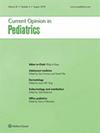Diastolic dysfunction: assessment and implications on the single ventricle circulation.
IF 2.2
3区 医学
Q2 PEDIATRICS
引用次数: 0
Abstract
PURPOSE OF REVIEW Patients with a functionally single ventricle (SV) are palliated with a series of procedures leading to a Fontan circulation. Over the life span, a substantial proportion of SV patients develop heart failure that can arise from circulatory or ventricular failure. Diastolic dysfunction (DD) is an important determinant of adverse outcomes in SV patients. However, assessment and categorization of DD in the SV remains elusive. We review recent literature and developments in assessment of DD in the SV and its relation to clinical outcomes. RECENT FINDINGS DD is prevalent in the SV and associated with worse outcomes. Occult DD can be exposed with provocative testing by exercise or preload challenge during catheterization. Likewise, sensitivity to detect DD may be increased via assessment of atrial function and strain imaging. Recent studies revisiting previous concepts such as incoordinate diastolic wall motion show that these are associated with SV end-diastolic pressures and post-Fontan recovery, yielding accessible DD assessment. Emerging technologies such as ultrafast ultrasound (UFUS) can provide noninvasive assessment of myocardial stiffness, inefficient diastolic flow patterns and intraventricular pressure gradients, thereby yielding new tools and insights into diastolic myocardial and hemodynamic properties. SUMMARY Characterizing DD in the SV continues to have substantial limitations, necessitating synthesis of multiple parameters into an overall assessment, accounting for their change over time, and in the context of the patient's clinical status. New and emerging techniques may help advance DD assessment and the ability to track response to treatment of new targets.舒张功能障碍:评估和对单心室循环的影响。
综述目的 功能性单心室(SV)患者可通过一系列手术实现丰坦循环来缓解病情。在 SV 患者的一生中,有相当一部分患者会因循环或心室功能衰竭而出现心力衰竭。舒张功能障碍(DD)是 SV 患者不良预后的重要决定因素。然而,SV 患者舒张功能障碍的评估和分类仍然难以确定。我们回顾了 SV 中舒张功能障碍评估的最新文献和进展及其与临床预后的关系。隐匿性 DD 可在导管插入术中通过运动或前负荷挑战等刺激性测试暴露出来。同样,通过评估心房功能和应变成像也可提高检测 DD 的灵敏度。最近的研究重新审视了以前的概念,如不协调的舒张壁运动,结果表明这些运动与 SV 舒张末期压力和 Fontan 后恢复有关,因此可以对 DD 进行评估。超快超声(UFUS)等新兴技术可对心肌僵硬度、低效舒张期血流模式和心室内压力梯度进行无创评估,从而为舒张期心肌和血流动力学特性提供新的工具和见解。新兴技术可能有助于推进 DD 评估和跟踪新靶点治疗反应的能力。
本文章由计算机程序翻译,如有差异,请以英文原文为准。
求助全文
约1分钟内获得全文
求助全文
来源期刊
CiteScore
6.20
自引率
0.00%
发文量
184
审稿时长
6-12 weeks
期刊介绍:
Current Opinion in Pediatrics is a reader-friendly resource which allows the reader to keep up-to-date with the most important advances in the pediatric field. Each issue of Current Opinion in Pediatrics contains three main sections delivering a diverse and comprehensive cover of all key issues related to pediatrics; including genetics, therapeutics and toxicology, adolescent medicine, neonatology and perinatology, and orthopedics. Unique to Current Opinion in Pediatrics is the office pediatrics section which appears in every issue and covers popular topics such as fever, immunization and ADHD. Current Opinion in Pediatrics is an indispensable journal for the busy clinician, researcher or student.

 求助内容:
求助内容: 应助结果提醒方式:
应助结果提醒方式:


